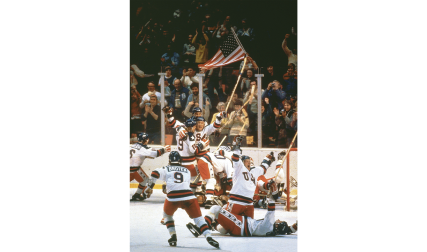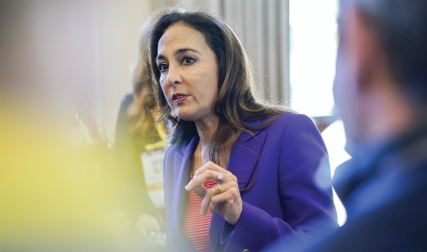Thanks, Harvey In reading the cover story about classmate Lisa Mendelson Friel ’79 [“Justice for All,” July/Aug] I was surprised she hadn’t mentioned it when I saw her at our 30th reunion, days before the magazine arrived in the mail. We went to school together from kindergarten through college, but in all those years I never knew I had played a role in her decision to apply to Dartmouth, as the story recounts.
My final decision to attend Dartmouth was made in part because of a conversation I had with yet another Haworth, New Jersey, resident, Harvey Weinberg ’78. He was a year ahead of us in school. When I bumped into him in the spring of 1975 he convinced me that Dartmouth—a school I had applied to but had never visited—was the place for me.
Deborah Krieger Jennings ’79 Upper Montclair, New Jersey
Bleeding Green John MacGovern ’80 [“Who Is John MacGovern,” July/Aug] represents many alumni who have long had trouble understanding the College’s direction on many levels. We may not agree with all that MacGovern espouses, but we recognize the importance of contrary thought and respect his diligence in presenting ideas unpopular to those currently controlling the institution.
Some alumni feel that the College has been in decline and may no longer produce an optimal product. Defining issues continue to be avoided, or at least few will breach them for fear of being called politically incorrect or worse.
Simply observe the self-perpetuating cabal controlling the board, the academics who have determined policy for much too long and value intellectualism over the creation of graduates with common sense, and the vast construction of costly buildings that do little to improve the true quality of the institution. When will the dilapidated and socially antiquated fraternities and sororities be eliminated and replaced with facilities that encourage inclusion and interaction rather than exclusion and separation? When will the board of trustees establish a financially viable 21st-century vision that proactively prepares graduates for a non-U.S.-centric world?
We need to hear more from individuals like MacGovern, whether we agree with them or not. There are diverse viewpoints throughout the alumni body and they need to be heard, rather than diminished by board-packing maneuvers.
Jim Guth ’77 Chicago
Proper response to the artful hatchet job on John MacGovern would far exceed your 200-word limit, but one salient contention demands correction: The thesis that MacGovern was behind the lawsuit is false.
The Association of Alumni (AoA)executive committee, in a majority vote, sued to protect the 1891 agreement (nothing “so called” about it) establishing parity between charter and alumni-elected trustees. We did so reluctantly, after the board of trustees repeatedly rebuffed or ignored our requests, first for a conference and then for mediation, insisting that no contract existed.
Because the College, through AoA secretary and the College’s vice president of alumni relations David Spalding ’76, refused us access to the addresses of our own membership so that we might inform alumni of our position and solicit funds necessary for litigation, we were forced to rely on the Hanover Institute (HI). Whether the HI would raise funds in its own name and directly accept responsibility for legal expenses or a separate entity would be established for that purpose was decided at the last moment, based on convenience.
From the outset, the executive committee majority made certain that conduct of the suit would lie solely with it. Neither MacGovern nor the HI ever exercised or sought any control of the suit.
Frank Gado ’58 White River Junction, Vermont
In writing about MacGovern, Dirk Olin ’81 raised the bar on bias in the first paragraph and continued raising it throughout the article. Up front he calls those who brought the legal action “conservative reformers” and the College the “establishment.”
First, he uses the word “conservative” as a pejorative. Second, he calls them “reformers” when they are not wanting to reform or change anything, just maintain the status quo—that is, “to regain a higher percentage of alumni-nominated seats on [the] board.” It is the “College establishment” that made the change.
From that point on, Olin continually attacks MacGovern personally.
Allowing such blatant bias in DAM makes it look as if its editors share the bias, which I’m sure they don’t.
Joel Lasky ’54 Dallas
I am among the least loyal alumni of the College, having developed stronger ties to Princeton, where I earned my Ph.D. and taught from 1965 to 1973 before accepting a professorship at the Institute of Fine Arts, New York University. (Both my children attended Princeton as well.)
The late 1950s were not a happy time at Dartmouth for a student planning to be a professor of art history—not because of faculty or facilities but because of the anti-intellectual atmosphere that pervaded undergraduate life. Fortunately I had the privilege of studying with Professor Robert H. Russell, who personified the rewards of teaching and scholarship and supported my career choice. Last November, during a reunion of his former students, I had the opportunity to tour the campus informally.
The changes I noticed are positive and profound.
I am pained to read in your story about John MacGovern that the College, a beneficial institution, has spent more than $1 million to defend itself against frivolous lawsuits, using money that could be available for scholarships. It is pointless to speculate on the motives of this misguided individual. Any rational, sentient human being can think of hundreds of educational and humanitarian charities that urgently need the money being squandered by the HI to support its counterproductive activities.
I am enclosing a $500 contribution to the Dartmouth defense fund—a trifling sum perhaps, but a measurable percentage of an academic salary.
Jonathan Brown ’60 Princeton, New Jersey
Going to the Well Buddy Teevens ’79 [“Letters, July/Aug] reminded me of an experience I had as Dartmouth’s golf coach. When after a shot of mine on the golf course English professor Henry Terrie asked, “How did you hit that one, coach?” I replied, “I hit it good.” In his chairman of the department voice Professor Terrie queried, “You mean you hit it well?”
“No, Henry,” I replied. “English professors hit the ball well. Golf coaches hit it good!
Bill Johnson Southern Pines, North Carolina
Well Read Congratulations on an excellent July/August issue. I especially enjoyed your interview with J.B. Daukas ’84 [“Enormous Change”], the John MacGovern ’80 story, the campus section and, especially, “In Too Deep” by Peter Heller ’82.
I cannot get my mind around the awful ocean degradation described by Heller and earlier described by Sylvia Earle, who was mentioned by Heller, in her book Sea Change. (I had local knowledge of Earle’s work early on as she grew up in my Florida town.)
Invading Iraq in pursuit of a failed energy policy is a radical action. At least that of Sea Shepherd is in pursuit of a winning policy: conservation of the sea supported by international law.
Fred Chase ’53 Waukegan, Illinois
Classless Society I agree with “Time for a Bigger Tent” [July/Aug] but would heretically go even farther. My own reunions have always been scheduled with the classes before mine, but most of my close friends were in the classes after mine. Thanks to Navy duty and geography, I never developed the class reunion habit.
In 1997 the Dartmouth Aires held its 50th reunion, inviting Aires from the classes of 1947 through 2000. This diversity of age united by an ageless commonality was so fulfilling that I’ve attended every subsequent reunion: 2000, 2003 and 2007. It’s great to see my age peers, but it’s even more fascinating to discuss as equals topics ranging from first-job hunting to retirement.
Attending reunions is a habit that feeds by strengthening relationships with people you care about. It’s possible that I might have developed the habit of attending class reunions if I could have seen more of my close friends or if I could have had more flexibility in scheduling. Maybe not. Overall, though, the “class of XX” segregation into groups of three classes has hindered, not motivated my visits to Hanover.
Robin Felix ’75 San Diego, California
Who are you closest to as an undergraduate? Your dormmates, your fraternity/sorority mates and the classmates from any activities you were in—in my case WDCR and The Dartmouth. They were from the classes of ‘70, ‘71 and ‘72, my year. So I happily trekked 6,000 miles to see these old friends for my fifth, 10th, 15th and 20th. I understand that the 25th should stand alone—as should the 50th—but I have not yet nor will I attend future solo-year reunions. There’s just not enough bang for the buck.
Mark Stitham ’72 Kailua, Hawaii
Hot Times “No Survivors” [Mar/Apr] described the DOC response to a wilderness air/ground search. Thanks to Paul R. Meyer ‘51 [“Letters,” July/Aug], who called attention to the DOC response to forest fires in the dust-dry fall of 1947. Following some initial training of a cadre by Ross McKenney, woodcraft advisor, the DOC led nearly 600 students who responded over a one-week period, logging some 12,000 hours while fighting fires on both sides of Mount Sunapee—one in Lebanon, New Hampshire, and one across the river.
The DOC worked with the Hanover fire department and high school in getting and refurbishing tools and providing student secretaries, with the White Church offering breakfast and preparing lunches for the 20-man crews (they had seven such crews on their peak day).
John Rand ’38 made the most of his connections and obtained permission for two flyovers per day to map the progress of the battle.
Finally the rains came and ended the ordeal. The tools were retrieved and returned to their donors and calm came over the campus. It was as if it never happened.
Bob Kendall ’49 Hopewell Junction, New York
Just the Beginning It seems your correspondent missed a key point in your story about Stuart Kauffman ’61 [“God Is In the Details,” May/June]. Kauffman asks, “When and how did molecules appear” and later states “…natural selection alone could not account for the richness of life.” Still later, he is “...searching for the initial conditions that allowed life to coalesce from a primordial soup,” all the while speaking of “chaos” and the random wandering of the elements. Finally Dartmouth biologist Mark McPeek says, “We haven’t proved or disproved the existence of God.”
And therein lies the key. No one can say with any degree of certitude that during the chaos of random bumping-intos there was not some supernatural something-or-other encouraging the “good guys” to find each other (coalesce, if you will) while discouraging the less desirable and keeping them out of the mix. We may call that whatever-it-might-have-been “(fill in the blank).” Science may have stopped at that point, but here is the beginning of faith.
Hal Johnston ’47 Montrose, Colorado




